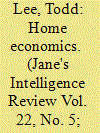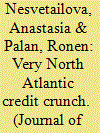| Srl | Item |
| 1 |
ID:
117489


|
|
|
|
|
| Publication |
2012.
|
| Summary/Abstract |
The Credit Crunch ushered in an era of austerity with massive cuts and job losses. It highlighted the gulf between the world of real people and the abstraction of high finance. Put simply, to prevent the melt-down of the global economy, the needs, hopes and ambitions of millions are being sacrificed. Who controls and issues money is key. To be viable any system must be big enough for people to have faith it won't fail, and it has to be administered soundly. Local government is accountable to its electorate and, as such, should put their welfare first. It is essentially an administrative machine and certainly isn't going to go away. A truly local economy could emerge with authorities initially paying part of their staff's wages in local currency and accepting it in payment of rates. At a stroke, job cuts could be reversed and people's skills and experience valued again.
|
|
|
|
|
|
|
|
|
|
|
|
|
|
|
|
| 2 |
ID:
085689


|
|
|
| 3 |
ID:
088488


|
|
|
|
|
| Publication |
2009.
|
| Summary/Abstract |
The recent financial market turmoil has initiated another search for insightful understanding of the interactions between the financial market and monetary policy. This paper explores these interactions in terms of the transmission mechanism of monetary policy in China. We argue that evolving financial development, enhanced by the expansion of the financial market, has altered the conventional channel for monetary transmission in China. Analyzing marked changes in the financial landscape and taking into account policy regime shifts in China, the paper provides clear evidence showing that the financial market has become a new and important channel for transmission of monetary policy in China.
|
|
|
|
|
|
|
|
|
|
|
|
|
|
|
|
| 4 |
ID:
095743


|
|
|
| 5 |
ID:
094024


|
|
|
|
|
| Publication |
2010.
|
| Summary/Abstract |
The International Monetary Fund (IMF) has become one of the most controversial international institutions in history. The IMF's crisis management responsibilities expanded via its involvement with a series of international economic crises during the last three decades, which led to widespread calls for radical reform of the organisation in the aftermath of the emerging market crises of the 1990s. This article examines the IMF's initial response to managing the effects of the global credit crunch, focusing on the new round of large IMF loans approved in late 2008 and early 2009, to assess how much IMF lending policies have changed in practice compared with earlier international crisis episodes. While the organisation has continued to promote conventional loan policy targets aimed at achieving low inflation, low budget deficits, and sustainable public debt, the preliminary evidence also suggests the IMF is developing a more flexible approach to crisis management in borrowing member states. Changes include a greater tolerance for unorthodox policies such as short-term capital controls, greater differentiation in the treatment of borrowers based on their economic circumstances, easier access to precautionary IMF financing for prime borrowers, and more flexibility in the use of loan conditionality.
|
|
|
|
|
|
|
|
|
|
|
|
|
|
|
|
| 6 |
ID:
141496


|
|
|
|
|
| Summary/Abstract |
This paper aims to answer this question: What were the causes of the severe slowdown in bank credit in Japan between 1999 and 2005? We test three credit crunch hypotheses, all together. The empirical results uncover the occurrence of a credit crunch that is attributed to bankers’ precautionary behavior rather than direct regulatory capital worries.
|
|
|
|
|
|
|
|
|
|
|
|
|
|
|
|
| 7 |
ID:
085705


|
|
|